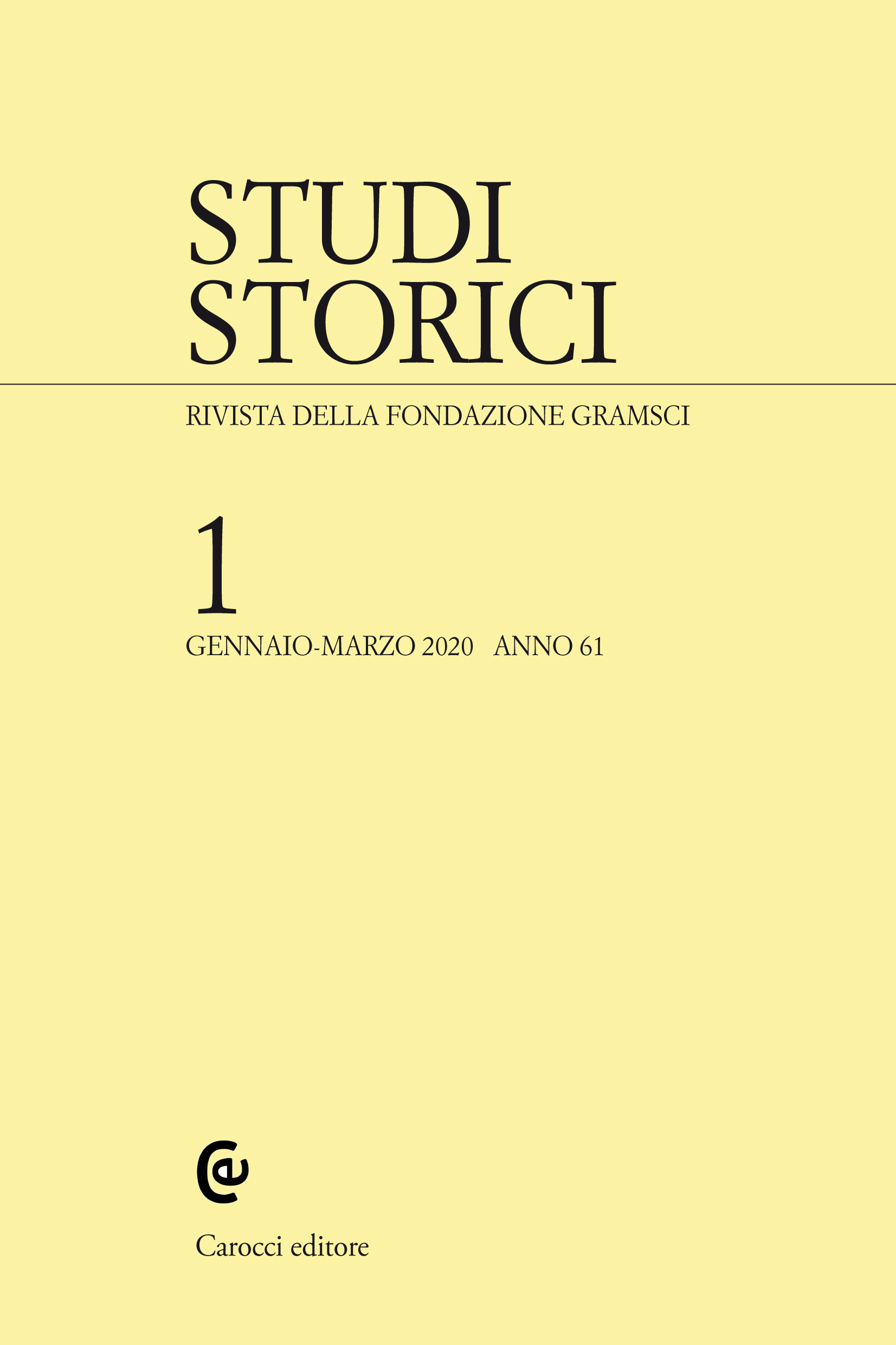
gennaio - marzo 2020 anno 61
Sommario e abstract degli articoli
Luciano Canfora, pp. 5-26
Su «Quaderni di storia»
On «Quaderni di storia»
This paper presents a critical selection of documents relating to the origins (1975) and growth of the historical review Quaderni di storia, with the story focusing on the factious reactions of a certain number of distinguished critics (from Arnaldo Momigliano to Cesare Cases and Sebastiano Timpanaro Jr.).
Keywords: «Quaderni di storia», Angelo Brelich, Marxising in Antiquity, Georg Picht.
Parole chiave: «Quaderni di storia», Angelo Brelich, Marxising in Antiquity, Georg Picht.
Ricerche
Fabrizio Oppedisano, pp. 27-39
Santo Mazzarino e il senato tardoantico
Santo Mazzarino and the Late Antique Senate
Santo Mazzarino explored the role of the late antique Senate in a plurality of works and from different perspectives. Like the tesserae of a polychrome mosaic, these pages make up a complex and original framework, in which the Senate is configured as a great protagonist of the late antique West. For Mazzarino, fourth- and fifth-century Western society was characterized by a general economic and political strengthening of the senatorial class. This interpretation, fundamentally different from Mommsen’s doctrine, allowed Mazzarino to connect the evolution of the late antique Senate with the crisis of the imperial State. In this way, for Mazzarino, the role of the Senate became a major factor in the periodization of the late antiquity.
Keywords: Santo Mazzarino, Roman Senate, Late antiquity, Constantine.
Parole chiave: Santo Mazzarino, Senato romano, Tarda antichità, Costantino.
Paolo Nanni, pp. 41-69
Il mercante retore. Francesco Datini e la solidità del sistema aziendale
The Merchant as a Rhetor: Francesco Datini and the Strength of the Holding Company
Argumentation in business settings has gained renewed interest within social science research. Managers are seen as rhetors, and the spread of a practice depends on the discursive justifications used to rationalize it. These topics are particularly relevant for understanding the business leadership of one of the most famous merchants of the late Middle Ages: Francesco Datini, «The Merchant of Prato.» The merchant rhetor’s persuasive effort was practiced daily through his letters (not theorized) and became a cornerstone for building both a strong holding company and a trusted relationship with his partners. This case study provides a contribution to the history of Middle Ages merchants’ culture and to the impact of language in business activities.
Keywords: Medieval History, Medieval merchants, Argumentation, Francesco Datini.
Parole chiave: Storia medievale, Mercanti medievali, Argomentazione, Francesco Datini.
Francesco Storti, pp. 71-101
La comunicazione diplomatica nelle stanze segrete di Ferrante D’Aragona (1458-1494): setting analitico o «artificio di franchezza»
The Diplomatic Communication in the Secret Rooms of Ferrante of Aragon (1458-1494): Psychoanalytic Setting or «Artificio di Franchezza»
During the 15th century, diplomacy in Italy underwent an extraordinary formalization process. The aims of diplomatic action were increasingly well defined, and the role of the ambassador was regulated and disciplined. A kind of standard diplomatic representation was reached by a common patrimony of gestures and words within those places predisposed for diplomatic communication. However, this system showed some rifts: cracks in which the seed of those forms that were to give life to the political season of the Reason of State was able to sprout. This essay analyzes precisely these cracks, starting from a privileged vantage point: the Aragonese court of Naples, which was one of the cradles for that new political practice.
Keywords: Diplomacy, Political practice, Reason of State, Aragonese Naples.
Parole chiave: Diplomacy, Political practice, Reason of State, Aragonese Naples.
Emanuele Edallo, pp. 103-128
Il censimento della razza del 22 agosto 1938 a Milano. Modalità attuative e gestione burocratica
The Race Census of 22 August 1938 in Milan. Implementing Procedures and Bureaucratic Management
The use of original sources has led to the reconstruction of happenings tied to the preparation, realization and management of the race census conducted by the fascist regime on August 22nd 1938 in Milan, organized and managed by the prefecture and by the city of Milan. A thorough reconstruction of the work carried out by Milan’s bureaucratic machine has shown just how the census led to an intrusion of the very lives of the individuals it accounted for. Additionally, it represented the initial phase of a wide-scale and in-depth persecutory action that gave rise to the proclamation of royal legislative decree 1728/1938. This dealt with a general yet genuine backing of the fascist-led administrative and bureaucratic apparatus, which was shown off in Milan for its considerable efficiency.
Keywords: Milan, Jews persecution, Census of 1938, Fascism.
Parole chiave: Milano, persecuzione degli ebrei, Censimento del 1938, Fascismo.
Antonio Bonatesta, pp. 129-163
La Banca europea per gli investimenti e la «comunitarizzazione» del dualismo italiano
The European Investment Bank and the «Communitarisation» of Italian Dualism (1958-1973)
This paper aims to contribute to the historiographical debate surrounding the forms of Italian economic development between the late 1950s and the early 1970s, from the perspective of the European Investment Bank (EIB). Using unpublished documentation from the Bank’s archives in Luxembourg, this study retraces the ways in which national authorities attempted to relocate the problem of the «Mezzogiorno» from the US financial context to the Common Market. This process was not without some basic contradictions, such as the constraint placed by reasons of European monetary stability and the fear of «inflationary contagions» as well as the relationship between productivity and employment. EIB’s credit policy had to take these elements into account.
Keywords: European Investment Bank, Mezzogiorno, Regional policy, Extraordinary intervention, Centre-left coalition.
Parole chiave: Banca europea per gli investimenti, Mezzogiorno, Politica regionale, Intervento straordinario, Centro-sinistra.
Elisa Tizzoni, pp. 165-191
Migrazioni e questione degli alloggi nella Cee tra anni Sessanta e Settanta. Due inchieste della Commissione europea
Migration and Housing Issues in the EEC between the 1960s and 1970s. Two Inquiries by the European Commission
This article deals with the debate on foreign workers’ housing conditions within the European Economic Community from its establishment until the mid-1970s, a topic thus far scantly investigated. The research aims to assess to what extent EEC politicians and public officers were influenced by opposing views on migration issues in the member states and national stereotypes, focusing on two surveys carried out on behalf of the European Commission, respectively, in 1959-1961 and in 1974-1975. The contribution applies an interdisciplinary perspective, by reference to models and concepts developed by the social sciences, in order to overcome the limits of an exclusively descriptive approach and provide a broader key to interpret EEC migration policy over the long term.
Keywords: Migration, European Economic Community, Housing policy, Stereotype, Assimilation.
Parole chiave: Migrazioni, Comunità economica europea, Politiche alloggiative, Stereotipo, Assimilazione.
Marco Di Maggio, pp. 193-227
Tra socialdemocrazie e perestrojka. Le relazioni internazionali del Pci nelle carte di Alessandro Natta (1984-1988)
Suddenly, a new mountain on the outskirts of Naples. The Phlegraean eruption of 1538
This essay reconstructs the foreign policy of the Italian Communist Party during the four years of Alessandro Natta’s secretariat (1984-1988) through largely original archival documentation, from the Alessandro Natta Fonds of the Historical Archive of the Chamber of Deputies. Natta’s papers are also cross-referenced with those kept in the PCI Archive at the Gramsci Foundation. The author analyses the relationship that the PCI establishes with Gorbachev’s Perestroika, Deng’s China, and European social democracies during the last years of the Cold War.
Keywords: Italian Communist Party, 1980s, End of the Cold War, Perestroika, Alessandro Natta.
Parole chiave: Partito comunista italiano, Anni Ottanta, Fine della guerra fredda, Perestrojka, Alessandro Natta.
Note critiche
Marzio Zanantoni, pp. 243-251
Il progetto grafico di «Studi Storici». La corrispondenza tra Albe Steiner e Gastone Manacorda
The Graphic Design of «Studi Storici». The Correspondence between Albe Steiner and Gastone Manacorda
The author reconstructs the correspondence between Albe Steiner and Gastone Manacorda in 1959 regarding the graphic design of the journal «Studi Storici».
Keywords: Albe Steiner, «Studi Storici».
Parole chiave: Albe Steiner, «Studi Storici».
Sfoglia gli altri numeri dell’anno 61 / 2020
Elenco dei fascicoli pubblicati dal 2010
Seleziona fascicolo...
- anno 65 / 2024
- 1
- 2
- anno 64 / 2023
- 1
- 2
- 3
- 4
- anno 63 / 2022
- 1
- 2
- 3
- 4
- anno 62 / 2021
- 1
- 2
- 3
- 4
- anno 61 / 2020
- 1
- 2
- 3
- 4
- anno 60 / 2019
- 1
- 2
- 3
- 4
- anno 59 / 2018
- 1
- 2
- 3
- 4
- anno 58 / 2017
- 1
- 2
- 3
- 4
- anno 57 / 2016
- 1
- 2
- 3
- 4
- anno 56 / 2015
- 1
- 2
- 3
- 4
- anno 55 / 2014
- 1
- 2
- 3
- 4
- anno 54 / 2013
- 1
- 2
- 3
- 4
- anno 53 / 2012
- 1
- 2
- 3
- 4
- anno 52 / 2011
- 1
- 2
- 3
- 4
- anno 51 / 2010
- 1
- 2
- 3
- 4
